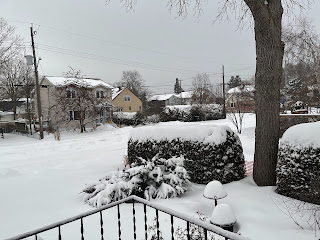My apologies for the lateness and brevity of this post. Like Rick, I spent most of Monday and yesterday digging out from 47+ cm of snow (that's about 20 inches) that had blown all over the place. It was very pretty and I was happy to see it, but moving it off the car and driveway, as well as off the paths and my three porches (one I use, one the postal and delivery people use, and one the dogs use) took a large part of the day and blew all my other plans out the window. And in between, the delighted dogs needed their walks. All this on a strained ankle that I am supposed to be "resting". A concept unknown to the dogs.
 |
| My back deck |
The positive in all this, besides the beautiful, fresh powder, is how much neighbours come out to help each other. The person with the snowblower becomes everyone's best friend. And the kids are thrilled. Watching them sliding down snow piles, making snow angels, and digging snow forts brought a smile to even the most disgruntled, exhausted passerby. The kids have had so much taken away from them the past two years that it was nice of Mother Nature to give them this little gift of joy.
While I was digging away, my mind was wandering around in alleys trying to figure out another title for my current book. I had just received word from the publisher that marketing did not like my title THERE BUT FOR FORTUNE. It doesn't roll the tongue. Does too, I thought, saying it fast several times in a row to prove my point. Besides, THE HUNDRED-YEAR-OLD MAN WHO CLIMBED OUT THE WINDOW AND DISAPEARED, doesn't exactly roll off the tongue either. My title is perfect and it captures the essence of the book in four words that harken back to the 1960s where the tragedies in my story began. That title hadn't just fallen from the sky; it came from hours and hours of searching. So I huffed and grumbled for awhile as writers always do when someone challenges a word of our perfect prose. Then the snow came, and I had to put all my grumbling aside to focus on real life.
 |
| My front porch |
Outside in the crisp, pristine world of white, I stopped mourning the loss of my beloved title and started to idly consider alternatives. Not staring at the screen demanding an answer but just playing with combinations of words and themes in my head. THERE BUT FOR FOTUNE is a perfect title, but it isn't the only perfect title. All day long I played, laughing at some of my comical creations, rejecting many as cliched or pretentious or meaningless. Nowadays snappy two-word titles are all the rage among the thriller crowd, also probably driven by the marketing set, but I did not want a title that sounded like everyone else's.
By the end of the day, I had a couple of viable alternatives – one of them only two words long! – and am now letting those percolate and roll around on my tongue for a few days before writing the publisher back. So stay tuned, and eventually I will announce who the winner is.
Meanwhile, it has started to snow again. To the shovels!
